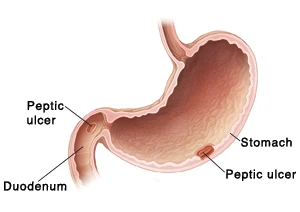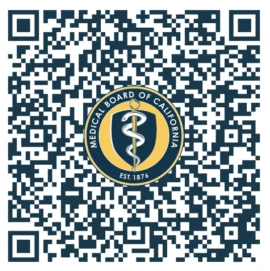A peptic ulcer is a sore in the lining of the stomach or duodenum (the first part of the small intestine). It can cause abdominal pain and other symptoms. In some cases, a peptic ulcer may worsen. This can lead to serious complications such as bleeding or perforation (a hole) in the stomach or duodenum. Treatment is needed to prevent these complications. With treatment, most people recover completely.
Common Causes of a Peptic Ulcer

A peptic ulcer can be caused by:
- Infection from Helicobacter pylori (H. pylori) bacteria
- Long-term use of pain medications called non-steroidal anti-inflammatory drugs (NSAIDs), such as aspirin and ibuprofen
NOTE: Stress and spicy food do not cause ulcers.
How a Peptic Ulcer Develops
The lining of your stomach and duodenum is coated with a thick mucus layer. This helps protect the stomach and duodenum from the acids and enzymes they make to help break down the food you eat. When H. pylori are present, they can weaken the mucus layer and irritate the lining underneath. Acid may pass through the weakened mucus layer and cause an ulcer to form. Overuse of NSAIDs can also damage the mucus layer, leading to ulcers.
Symptoms of a Peptic Ulcer
Peptic ulcers may or may not cause symptoms. If you do have symptoms, they may come and go. They may also range from mild to severe. Common symptoms include:
- Burning, cramping, or hunger-like pain in the stomach area, often 1 to 3 hours after a meal or in the middle of the night
- Pain that gets better or worse with eating
- Loss of appetite
- Weight loss
- Nausea or vomiting (vomit may be bloody or look like coffee grounds)
- Black, tarry, or bloody stools (this means the ulcer is bleeding)
Diagnosing a Peptic Ulcer
Your doctor will ask about your symptoms and health history. You’ll also have a physical exam. In addition, tests will be done to confirm the problem. These tests also help determine if an ulcer is caused by H. pylori. Tests can include:
- Upper endoscopy. This test is done to see inside the stomach and duodenum. This allows the doctor to check for ulcers. During the test, an endoscope (“scope”) is used. This is a thin, flexible tube with a tiny camera on the end. The scope is inserted through the mouth. It is then guided down into the stomach or duodenum. If needed, tools may be passed through the scope to take tissue samples (biopsy). Treatment can also be done at the same time if bleeding or other problems are found.
- Upper gastrointestinal (GI) series. This test is done to take x-rays of the upper digestive tract from the mouth to the small intestine. This allows the doctor to check for ulcers. For this test, you’ll drink a chalky liquid that contains a substance called barium. The barium coats your upper digestive tract so that it will show up clearly on x-rays.
- Blood, stool, or breath tests. These are done to check for H. pylori and other problems. For blood and stool tests, small samples of your blood and stool are taken. The samples are then sent to a lab and analyzed. For a breath test, you’ll drink a liquid that contains a harmless compound. H. pylori causes the compound to break down and release carbon dioxide gas. By testing the air you breathe out after you drink the liquid, the doctor can tell if the bacteria are present.
Treating a Peptic Ulcer
Medications are the most common treatment for peptic ulcers. They include:
- Antibiotics. These kill H. pylori bacteria. In many cases, you’ll need to take at least two types of antibiotics.
- Proton pump inhibitors. These block your stomach from making any acid.
- H2 blockers. These reduce the amount of acid your stomach makes.
- Bismuth subsalicylate. This helps protect the lining of your stomach and duodenum from acid.
Be sure to take ALL of the medications that you’re prescribed exactly as instructed. Do not stop taking the medications even if you are feeling better. The medications may cause side effects. Your doctor will tell you more about these based on which medications are prescribed for you. During treatment, avoid aspirin and other NSAIDs. You may also be advised to avoid cigarettes, alcohol, and caffeine. These may worsen your symptoms or affect how well your ulcer heals.
In severe cases, other treatments will likely be done. These may include procedures with an endoscope or surgery. Your doctor will tell you more about these treatments, if needed.
Preventing a Peptic Ulcer
Take the following steps to help prevent a peptic ulcer:
- Reduce your risk of H. pylori infection. It is not known for certain how H. pylori is spread from person to person. But most researchers think that it can be passed through food or water contaminated by an infected person. As a precaution, the Centers for Disease Control and Prevention (CDC) recommends following basic hygiene standards. For instance, always wash your hands with warm water and soap after using the bathroom. Also do this before preparing and handling food. In addition, drink water only from safe sources.
- Limit the use of NSAIDs. Work with your doctor to change your medication or to reduce the amount of NSAIDs you take. If you must take NSAIDs, ask your doctor about medications you can take to help protect your stomach and duodenum.
When to Call the Doctor
Call your doctor right away if you have any of the following:
- Fever of 100.4°F or higher
- YFrequent vomiting or blood in your vomit
- Sudden or severe abdominal pain
- Dark, tarry, or bloody stools
- Weight loss
- Pain that does not improve even with treatment


